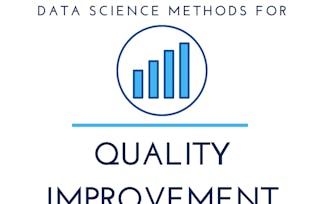This course provides a framework for how analysts can create and evaluate quantitative measures. Consider the many tricky concepts that are often of interest to analysts, such as health, educational attainment and trust in government. This course will explore various approaches for quantifying these concepts. The course begins with an overview of the different levels of measurement and ways to transform variables. We’ll then discuss how to construct and build a measurement model. We’ll next examine surveys, as they are one of the most frequently used measurement tools. As part of this discussion, we’ll cover survey sampling, design and evaluation. Lastly, we’ll consider different ways to judge the quality of a measure, such as by its level of reliability or validity. By the end of this course, you should be able to develop and critically assess measures for concepts worth study. After all, a good analysis is built on good measures.

Measurement – Turning Concepts into Data

Measurement – Turning Concepts into Data
This course is part of Data Literacy Specialization

Instructor: Jennifer Bachner, PhD
Access provided by FutureX
3,905 already enrolled
82 reviews
Skills you'll gain
Details to know

Add to your LinkedIn profile
16 assignments
See how employees at top companies are mastering in-demand skills

Build your subject-matter expertise
- Learn new concepts from industry experts
- Gain a foundational understanding of a subject or tool
- Develop job-relevant skills with hands-on projects
- Earn a shareable career certificate

There are 4 modules in this course
Scientists and social science researchers are tasked with measuring concepts of all types. Some are quantitative, like blood pressure, while others are qualitative, like support for a policy proposal. Moreover, some measures are at the individual level while others are aggregated. This module will focus on distinguishing between different types of measures, different types of units and the advantages and disadvantages of these differences. By the end of this module, I think you'll better appreciate the amount of judgment and decision making that is required to perform a statistical analysis, an in particular, to create and select measure of the concepts you care about studying.
What's included
4 videos5 readings4 assignments
Researchers are often tasked with analyzing concepts that are difficult to measure. As an example, think about the issue of immigration. A full consideration of policies related to immigration requires analysts to measure concepts such as border security, competition for jobs and employer needs. While there is broad agreement in most governments about the need for border security, there is disagreement about the extent to which their borders are currently secure. How could you measure border security? You could collect data on the amount of money spent on border security, the number of border patrol agents, the amount of physical barriers in place, the apprehension rate of undocumented immigrants and the deportation rate of undocumented immigrants. Some of these measures are inputs while others are outputs. All of these measures capture some aspect of border security. Which measure would you use? Why is this the most appropriate measure? Could you use a combination of measures? This module will explore these questions by examining the measurement process. We'll discuss conceptualization, operationalization and how to create full measurement models based on operationalized concepts.
What's included
3 videos5 readings4 assignments
V. O. Key, a renowned public opinion scholar, wrote that “to speak with precision of public opinion is not unlike coming to grips with the Holy Ghost.” But although survey research is challenging, it is an essential tool in both government and business. Survey research allows researchers to measure opinion and behavior in a wide range of areas, build an understanding of how abstract concepts are perceived, develop and test theories of opinion formation and formulate policy recommendations. In the public sphere, surveys give public officials insight into the views of their constituents and allow citizens to hold their governing officials accountable. In the private sphere, companies use surveys to measure their customers' experiences and levels of satisfaction with goods and services. This module will cover the three fundamental pillars of survey research: sampling, design and evaluation.
What's included
5 videos4 readings4 assignments
After you have designed a measurement tool, whether it is a survey, test, data collection technique or some other approach, it is essential to evaluate that tool. It is inevitable that a measurement tool will suffer from some degree of measurement error. If the error is well-understood and not overwhelmingly large, there are statistical techniques a researcher can use to address that error in an analysis. This module will introduce the concepts of systematic and random measurement error and explore how this error affects the reliability and validity of a measurement tool.
What's included
3 videos4 readings4 assignments
Earn a career certificate
Add this credential to your LinkedIn profile, resume, or CV. Share it on social media and in your performance review.
Instructor

Offered by
Why people choose Coursera for their career

Felipe M.

Jennifer J.

Larry W.

Chaitanya A.
Learner reviews
- 5 stars
79.26%
- 4 stars
17.07%
- 3 stars
2.43%
- 2 stars
1.21%
- 1 star
0%
Showing 3 of 82
Reviewed on Jun 2, 2021
Very well presented. Readings came from a variety of sources, exposing the learner to sites where we can continue to learn more about this topic.
Reviewed on Mar 13, 2021
Note that the reading for week 4, Validity, requires a puchase to access
Reviewed on Nov 28, 2022
I typically only audit courses now since I like to learn in my way and do homework when I want. This was a valuable primer for me on the fundamentals of measuring data.
Explore more from Data Science

Unilever

University of Colorado Boulder

Johns Hopkins University


